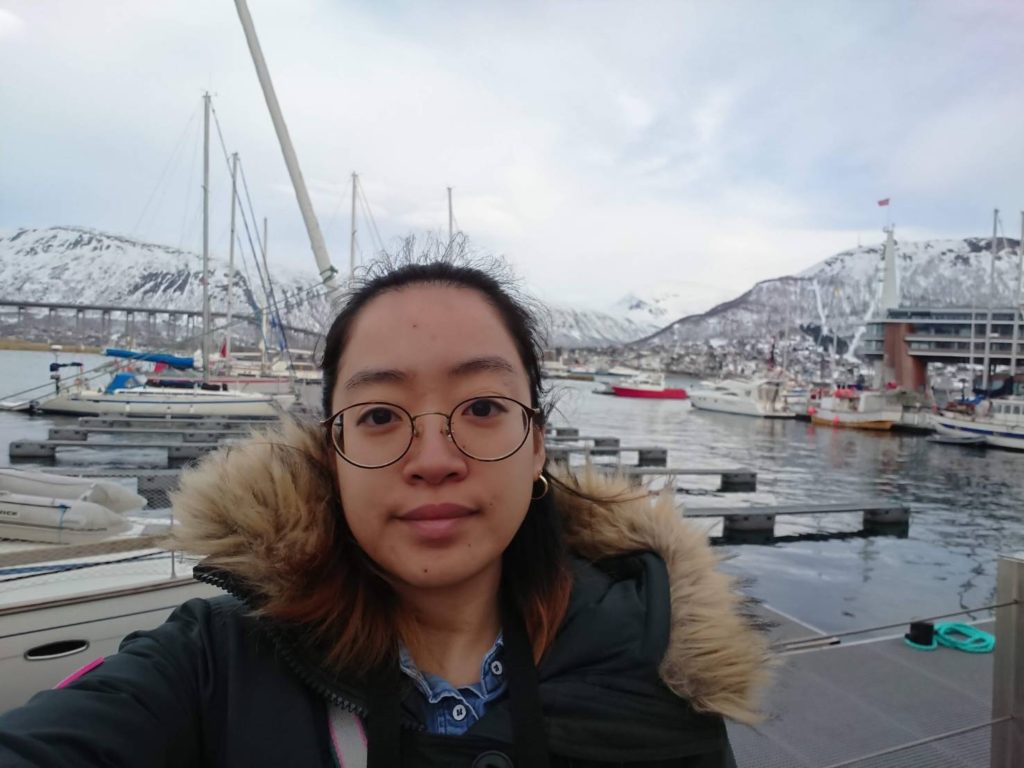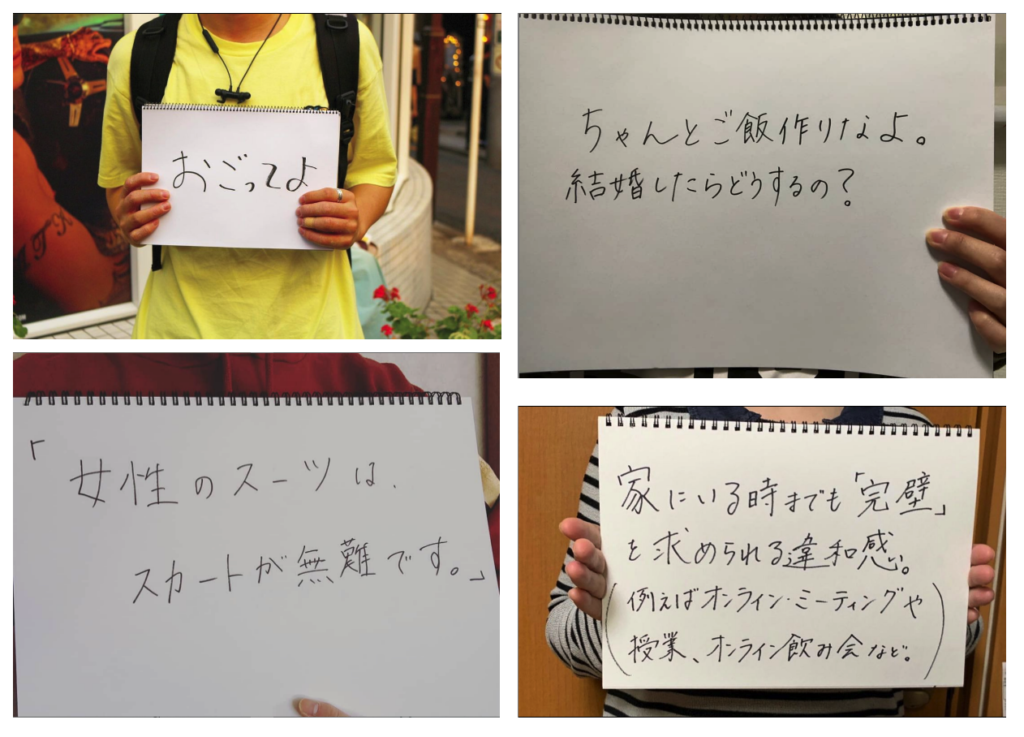Features Our Everyday Gender Experiences and Questions on Social Media: An Interview with ID20 Hanako Uwabe from Speak Up ICU

Our last interview of this academic year features Hanako Uwabe, who is an active member of Speak Up ICU.
Speak Up ICU is a student activist group that conducts interviews not only with ICU students but also with people outside the ICU community about offhanded gender-related remarks they have received. Speak Up ICU features such remarks on their social media pages to spread awareness. As the social media manager, she’s made more than 90 posts so far.
In our interview with Hanako Uwabe, she told us not only about Speak Up ICU’s activities but also her personal stories and her views on society that hasn’t achieved gender equality, including what motivated her to join the group, how she manages social media, what she believes we individuals can do for gender equality, and her message toward society.
Q1. Please tell us about what you do.
I am a member of Speak Up ICU.
What we have been doing in Speak Up ICU is to conduct street interviews to collect gender-related questions people have and remarks/comments they’ve received that have stuck in their minds, and post them on social media. And, we post them on our social media.
We conduct our street interviews in busy places with office workers and students, such as Shinbashi station and Kichijoji. We ask people to write their questions or remarks on a notepad, take photos of them, and post them on our social media. We hope our posts will allow more people to be aware of what other people have experienced.
I joined Speak Up ICU in the winter of 2019, when the group was recruiting new members after its official launch. In the group, I’m in charge of social media management.
Speak Up ICU was originally created by two senior members as a part of their course project in Music Management Theory class in the winter term.
This Music Management Theory course project was designed to implement a method, called Socially Engaged Art (SEA), in which artists, playing a central role, produce dialogues through art and music to encourage the reformation of social values. Choosing gender as a theme and approaching it through art, Speak Up ICU’s founding members launched the project in which they used social media, such as Instagram, to appeal to many people.
Right now, since we can’t do street interviews due to the pandemic, we switched to online questionnaires, and we collect everyone’s voices through Google Forms. Besides our interview style, the other shift is that we switched our targets from random people on the street to mostly ICU students.

Q2. You mentioned you joined the group almost two years ago. What motivated you to become part of Speak Up ICU?
Even before becoming a member, I’d known the group since I was following their social media account. When I came back to Japan from my study-abroad program in my third year, I was looking for a new opportunity to try something new and I found the Speak Up ICU’s new members recruitment post.
At that time, I started working at LUSH as well. Through communicating with our customers, I realized that most of them didn’t have much interest in LUSH’s slogans or messages, but were more interested in LUSH as a brand. Since its launch, LUSH has been promoting the message “Make humans, animals, and the planet happy and healthy” under the slogan “Fresh Lush Life.” They use fresh ingredients and make sure their production process doesn’t harm any creatures. They also respect both their customers and employees as people, and value their diverse perspectives.
I also realized the importance of spreading knowledge on gender that I studied at university to others, instead of keeping it to myself to deepen my own understanding.
Since I found Speak Up ICU’s member recruitment post at the same time that I wanted to spread my ideas and try something new, I decided to become a member.
Q3. So you are studying gender studies at university. Were you interested in this academic field in the first place?
Before university, I wasn’t really thinking about gender; instead, I wanted to work in education and solve issues surrounding poverty at the United Nations. What inspired me to change my interests was that I took the History of Nude course in my first year at university before transferring to ICU. During my study abroad in England in my third year, I was studying fashion marketing which allowed me to consider the connection between fashion and gender.
In my graduation thesis, I am analyzing English lesbian literature from a gender studies perspective. I picked Miss Ogilvy Finds Herself for my thesis and found this piece very interesting, because I was gradually able to see its historical background through countless re-readings.
Q4. You seemed to have studied gender from various perspectives during your four years at university. How did you feel when you started your activities at Speak Up ICU?
If I describe my feelings in one word, it was nervousness.
Since we were to interview not only ICU students but also people already working, I felt excited, but at the same time, I wasn’t sure if I could break the ice and engage in conversation with them well.
However, I was very busy when I joined Speak Up ICU in winter term, and then the pandemic hit right after, so I didn’t have a chance to do interviews. But I remember I had mixed feelings of both excitement and nervousness.
Q5. When do you feel motivated?
I believe the number of “Likes” reflect people’s empathy, so comments and “Likes” make me happy. Right now, we are collecting people’s voices through our online questionnaire, and I’m glad that people are filling it out already.
Sometimes I feel like my job is nothing other than posting photos on social media, and I am not sure if our posts actually reach people. That’s why, when we receive “Likes,” I feel very motivated.
Q6. What are you careful about when managing social media?
We put a lot of thought into coming up with the style where our interviewees write their words on our notepad by themselves. We think handwritten words are more likely to make people feel that those words are real more than typed ones do, so we would like to keep our analogue vibes.
We also make sure that the hands or clothes in our photos don’t reveal people’s gender. In some cases, the comments on the notepad give away the gender, but we make sure our photos won’t encourage gender biases so people who see our posts wouldn’t think, “It’s a girl again.”
Q7. Do you have any goals regarding social media management?
My first goal is to increase the number of our social media followers. In our meetings, we came up with some ideas of collaborating with other gender-related groups or ICU’s Center for Gender Studies (CGS). Since our capacity is limited, however, we can hardly expand our activities right now. We hope we can diversify our activities as a group in the future.
Q8. What does activism mean to you?
I think doing activism in Japanese society is very difficult because I feel like people often bring you down and say, “you’re just a university student” if you speak up. What is challenging for activists in Japan is that they need to fight against such voices and society as a whole, which is so consertive that systems, laws, and situations rarely change despite activism.
Q9. So you want to continue to try new things. What have you learned or realized from your activism?
My engagement with Speak Up ICU made me very aware that our society is overflowing with outdated comments. I also feel that those comments emphasize the subject too much. For example, “men are always…” “young people are always….” etc. In my life, I have never been told, “you have to behave yourself because you’re a girl,” so I didn’t have the point of view that he/she should behave in a certain way because he is a man or because she is a woman. But, after joining Speak Up ICU, I realized there are so many people who make unconscious discriminatory remarks and I became more aware of the severity of gender issues.
My job hunting experiences also allow me to consider gender issues. In job interviews, as I talk about what I’m studying in gender studies and what I’m doing in Speak Up ICU as a response to the question of what I study at university, in most cases interviewers react like, “that’s a recent trend,” “that’s great,” and “I was wondering if it’s okay to ask you about it.” Their reactions show that they think gender issues are someone else’s affairs. Because I discuss gender topics with friends like it’s the most natural thing at ICU, I found a huge gap between society and the ICU community.
Q10. What would you like ICU students to know?
I want ICU students to know that so many outdated ideas remain in society that are hardly changing. I also want them to know that we’re only university students but we’re still important. Even if it’s not as grand as activism, there’s something we can do in our daily lives as university students, such as talking about gender with our friends and family members in our conversations.
Q11. What would you like to tell society?
This is what I found striking in my job hunting experiences, but the reactions of companies’ Human Resources managers make gender issues sound like someone else’s problem as I tell them what I want to pursue in my career. This frustrates me because if a company changes just one thing in their system or their TV commercials, it could have a much bigger influence than a single person taking action for social issues. I found it very problematic that society allows people to not have a sense of responsibility for gender issues.
What I want to tell society is to have a sense of responsibility. There is a dominant image that gender topics are a current trend, and therefore, those who talk about it are perceived as smart alecks or receive negative feedback, like “oh, this topic again.” This is not limited to gender issues, but any social issue cannot be solved just by people who are most affected by them. I believe those who are not marginalized or those who don’t seem to be related to gender issues need to participate equally.
Q12. Please tell us what you would like to try next.
Right now, I don’t have a clear goal of what I want to do next. But since my graduation is just around the corner, I’m hoping to keep up my current motivation level and keep my eyes open even after my position as a university student comes to an end and I start working!
[ Speak Up ICU SNS ]